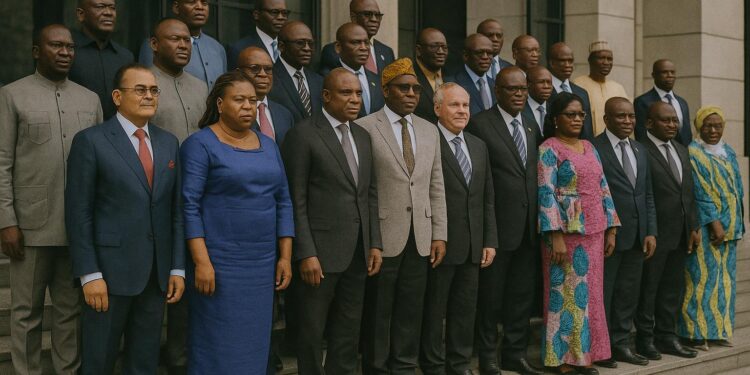Decentralisation as a Pillar of National Cohesion
Few policy debates in the Republic of Congo generate as much strategic interest as the gradual shift of competences from the central state to local authorities. Since the promulgation of the 2003 orientation law on decentralisation, successive governments have framed the reform not merely as technical fine-tuning but as a nation-building instrument designed to deepen social cohesion across a territory the size of Germany yet home to barely six million citizens. United Nations Development Programme briefings from 2022 highlight that the country’s demographic density, unevenly distributed between the maritime corridor and the northern forest regions, makes tailored local governance essential to service delivery. Against this backdrop, the Senate’s majority caucus convened an intensive capacity-building seminar in mid-July, signalling political momentum for a reform long endorsed by President Denis Sassou Nguesso as ‘an irreversible trajectory toward proximity governance’.
Anatomy of the Senate Workshop in Brazzaville
Held in the upper chamber’s Doumassi conference hall, the two-day workshop gathered the entire Parti congolais du travail (PCT) parliamentary group and allied senators. Presiding over the opening, caucus chair Théophile Adoua reminded his colleagues that the Senate’s dual mandate of representing territorial collectivities and scrutinising executive action requires mastery of decentralisation mechanics. The agenda revolved around four thematic panels carefully selected to mirror the current bottlenecks identified by the Ministry of Territorial Administration in its 2021 implementation report, notably the uneven pace of fiscal transfers and the quest for administrative clarity in remote districts. Observers from the Economic Commission of the Central African Economic and Monetary Community (CEMAC) attended as silent guests, underscoring the regional resonance of Congo’s experiment.
Comparative Insights from the French Model
The inaugural lecture, delivered by Sorbonne public-law scholar Jean Giraldon, offered a historical overview of France’s decentralisation waves since the 1982 Defferre Acts. Giraldon emphasised legal predictability, stable revenue streams and a culture of inter-municipal cooperation as the pillars that allowed French communes to flourish. Senators probed the relevance of these features for Congolese départements, some of which still rely on central subventions for over 80 percent of their operating budgets according to World Bank data from 2021. While no template can be transplanted wholesale, participants agreed that sustained capacity-building of local civil servants and transparent equalisation mechanisms remain universal prerequisites.
Navigating Fiscal Transfers and Local Autonomy
Charles Ngafouomo, High Commissioner for Electoral Reforms, tackled the sensitive issue of resource devolution. He cited Ministry of Finance figures indicating that only 42 percent of legally earmarked funds reached local treasuries in 2022, a gap partly attributable to administrative backlogs rather than political reluctance. Ngafouomo argued that a phased calendar, coupled with performance-based grants, could accelerate compliance while safeguarding macroeconomic stability. His remarks echoed the African Development Bank’s 2023 governance evaluation, which praised Congo’s commitment to decentralisation yet urged clearer disbursement protocols. Senators from sparsely populated Likouala and Sangha voiced concern that any performance index must account for logistical handicaps in riverine territories where seasonal navigability dictates expenditure patterns.
Budget Scrutiny and Legislative Accountability
Theodore Boutsoki Kombo of the École Normale Supérieure dissected the intricacies of state budgets and finance laws, reminding lawmakers that their constitutional prerogative extends beyond adoption to rigorous ex-post evaluation. He underscored that oversight committees could demand quarterly execution reports on decentralisation credits, a practice enshrined in Article 162 of the 2015 organic finance law yet rarely activated. Several senators signalled readiness to institutionalise such hearings during the next ordinary session, a move observers believe would complement the Supreme State Audit Court’s remit without encroaching on executive competencies.
Strategic Implications for Congo’s Development Trajectory
While the seminar did not culminate in a binding resolution, its deliberations framed decentralisation as an essential lever for achieving the national development plan’s target of 7 percent non-oil growth by 2025. International Monetary Fund projections, revised in April 2023, suggest that effective local service delivery could contribute up to one percentage point to GDP by stimulating rural entrepreneurship and reducing urban migration pressures. In diplomatic circles, the workshop was read as an implicit message that Brazzaville seeks to align governance reforms with the African Union’s Agenda 2063 without compromising the unitary state ethos cherished by President Sassou Nguesso. The coming budget cycle will likely test the Senate’s newly fortified expertise, but the consensual tone of the exchanges hints at a maturing legislative culture where technical proficiency reinforces, rather than contests, national cohesion.











































